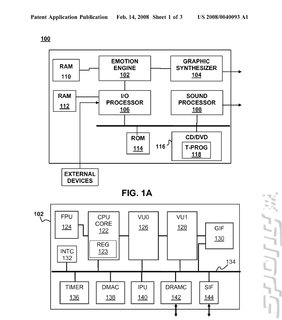Lots of PlayStation 3 Backwards Compatibilty Patents
'New patent' discovered... but where is it.

Silconera is running a fascinating story regarding an unnumbered Sony patent. The story has been picked up and duplicated elsewhere. The nub is "Sony developed a way to translate instructions from an Emotion Engine chip into chunks that can be referenced."
This is referenced to a 'recent' though unstated patent. The original story states that the patent illustrates, "an example of a host system based on a cell processor that may be configured to emulate the target system."
This story is being used to support tales of the PS3 Slim that will use backward compatibility.
We've had a look - because backward compatibility for the PS2's Emotion Engine via the PS3's Cell would be good news... and we've also spotted some other, referenced, patents that you can look at too.
Application Number: 11/696,691 (Publication number: US 2008/0040093 A1): "Register Mapping In Emulation Of A Target System On A Host System" from Sony Computer Entertainment Inc.
First claim: "A method for emulation of a target system on a host system". Point 0008 "For example, the target device maybe a game console such as the PlayStation 2..." while page 2 goes on to detail the issues with emulation of the PS2s emotion engine on, for example... the PS3.
The filing date? April 4, 2007.
You can go and look at it here.
You can also see:
Publication number: US 2007/0277052 A1: "Methods and systems for resolving clock management issues in emulation of a target system on a host system..."
Filing date: Apr 4, 2007
Or have a look at this one, again by Stewart Sargaison of Sony, which also details emulation within a Cell Processor.
Application number: 11/696,684
Publication number: US 2007/0261039 A1
Filing date: Apr 4, 2007
Lots of lovely Sony patents for Emotion Engine patents; all referenced. All from April 2007. They certainly could end up in a PS3 Slim. As we're not the most techie people in the world, maybe our more technically minded readers could give the patents the once-over and report back.
Meanwhile we're hunting down the number of the Siliconera-sourced patent. We'll, someone has to.
This is referenced to a 'recent' though unstated patent. The original story states that the patent illustrates, "an example of a host system based on a cell processor that may be configured to emulate the target system."
This story is being used to support tales of the PS3 Slim that will use backward compatibility.
We've had a look - because backward compatibility for the PS2's Emotion Engine via the PS3's Cell would be good news... and we've also spotted some other, referenced, patents that you can look at too.
Application Number: 11/696,691 (Publication number: US 2008/0040093 A1): "Register Mapping In Emulation Of A Target System On A Host System" from Sony Computer Entertainment Inc.
First claim: "A method for emulation of a target system on a host system". Point 0008 "For example, the target device maybe a game console such as the PlayStation 2..." while page 2 goes on to detail the issues with emulation of the PS2s emotion engine on, for example... the PS3.
The filing date? April 4, 2007.
You can go and look at it here.
You can also see:
Publication number: US 2007/0277052 A1: "Methods and systems for resolving clock management issues in emulation of a target system on a host system..."
Filing date: Apr 4, 2007
Or have a look at this one, again by Stewart Sargaison of Sony, which also details emulation within a Cell Processor.
Application number: 11/696,684
Publication number: US 2007/0261039 A1
Filing date: Apr 4, 2007
Lots of lovely Sony patents for Emotion Engine patents; all referenced. All from April 2007. They certainly could end up in a PS3 Slim. As we're not the most techie people in the world, maybe our more technically minded readers could give the patents the once-over and report back.
Meanwhile we're hunting down the number of the Siliconera-sourced patent. We'll, someone has to.
Companies:
Sony
Read More Like This
Comments
Isn't it the GPU that's still there in the half-compatible models? So they already have EE emulation. What we need is GSX emulation!
